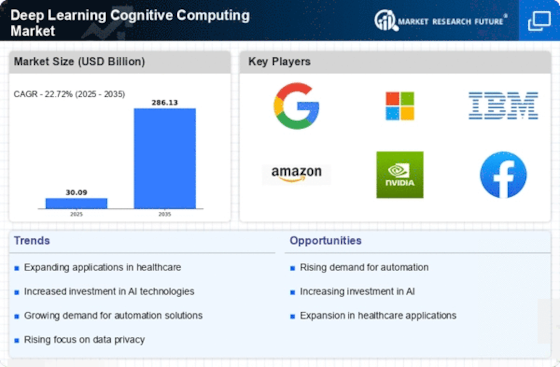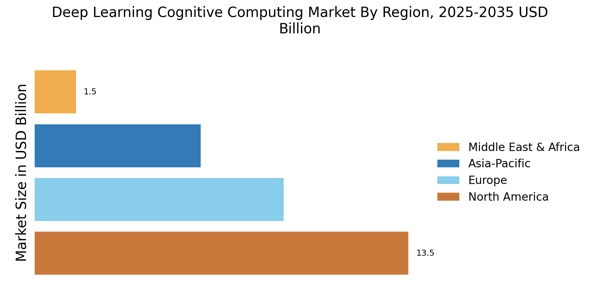Rising Demand for Automation
The Deep Learning Cognitive Computing Market is experiencing a notable surge in demand for automation across various sectors. Organizations are increasingly adopting deep learning technologies to enhance operational efficiency and reduce human error. This trend is particularly evident in manufacturing and logistics, where automated systems powered by cognitive computing are streamlining processes. According to recent estimates, the automation market is projected to reach USD 200 billion by 2026, indicating a robust growth trajectory. As businesses seek to optimize their workflows, the integration of deep learning solutions becomes essential, driving the expansion of the Deep Learning Cognitive Computing Market.
Enhanced Data Analytics Capabilities
In the current landscape, the Deep Learning Cognitive Computing Market is significantly influenced by the growing need for advanced data analytics capabilities. Organizations are inundated with vast amounts of data, necessitating sophisticated analytical tools to derive actionable insights. Deep learning algorithms excel in processing and analyzing complex datasets, enabling businesses to make informed decisions. The market for data analytics is expected to surpass USD 300 billion by 2025, underscoring the critical role of cognitive computing in this domain. As companies increasingly rely on data-driven strategies, the demand for deep learning solutions is likely to escalate, further propelling the Deep Learning Cognitive Computing Market.
Integration of AI in Business Processes
The integration of artificial intelligence into business processes is a pivotal driver for the Deep Learning Cognitive Computing Market. Companies are recognizing the potential of AI to transform operations, enhance customer experiences, and drive innovation. This integration often involves deploying deep learning models that can learn from data and improve over time. As organizations strive to remain competitive, the adoption of AI technologies is projected to grow, with the AI market expected to reach USD 500 billion by 2024. This trend indicates a strong correlation between AI adoption and the growth of the Deep Learning Cognitive Computing Market.
Growing Investment in Research and Development
Investment in research and development is a crucial factor propelling the Deep Learning Cognitive Computing Market. As technology evolves, companies are allocating substantial resources to innovate and refine deep learning algorithms. This investment is not only fostering advancements in cognitive computing but also enhancing the overall capabilities of deep learning systems. Reports suggest that R&D spending in the tech sector is anticipated to reach USD 1 trillion by 2025, highlighting the commitment to innovation. Such investments are likely to yield breakthroughs that will further stimulate the growth of the Deep Learning Cognitive Computing Market.
Increasing Need for Personalized Customer Experiences
The demand for personalized customer experiences is becoming a significant driver in the Deep Learning Cognitive Computing Market. Businesses are leveraging deep learning technologies to analyze consumer behavior and preferences, enabling them to tailor products and services accordingly. This trend is particularly pronounced in retail and e-commerce, where personalized recommendations can significantly enhance customer satisfaction and loyalty. The market for personalized marketing solutions is projected to grow to USD 10 billion by 2026, indicating a strong inclination towards customization. As companies prioritize customer-centric strategies, the role of deep learning in delivering personalized experiences is likely to expand, further influencing the Deep Learning Cognitive Computing Market.

















